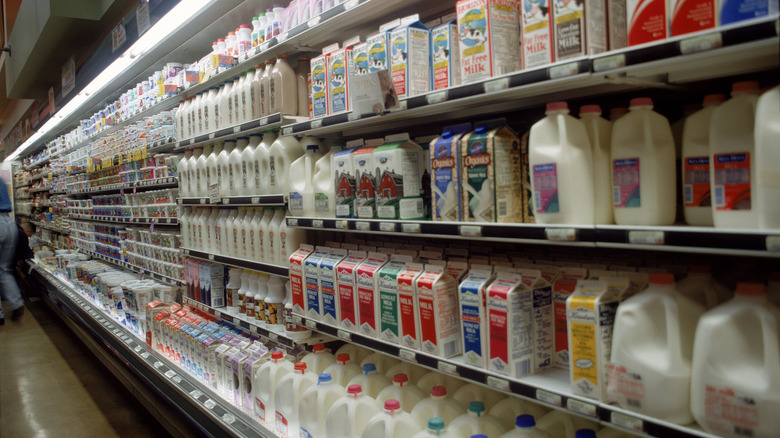What It Means If Your Milk Carton Is Bloated
Depending on your household and your go-to meals and snacks, there's a pretty good chance that milk goes quickly in your home. Still, the risk of milk expiring in the fridge before it's finished is always a lingering concern, considering that dairy products simply don't have a very long shelf life and that once they're spoiled, they're terrible-tasting and unsafe to consume. For that reason, we're always on the lookout for milk safety information, like asking how long does milk last when sitting out on the counter? Or how come organic milk has a longer shelf life?
Now, we're turning our attention to a strange but not uncommon phenomenon: Why do milk cartons bloat and what does that mean? Is a puffed box a red flag for milk gone bad? The answer is, well, it's complicated. A bloated milk carton could be totally harmless, or it could be a sign of spoilage.
It's totally harmless when it's the result of air pressure changes due to altitude or temperature. It's not so harmless, of course, when it's happening because of bacterial growth or contamination. There's a third case, too, which is less typical but still handy to know: If you get milk that's unpasteurized or has active cultures, fermentation could happen inside of the carton, and this process creates gas that builds up. When it comes to determining which case you're dealing with, consider where you live, temperature changes, expiration dates, and other signs of spoilage.
How bloating happens in milk cartons
Now that we know what bloated milk cartons mean, how do they actually get that way in each case? When it comes to the safe kind of bloating, it's a reaction of the air inside the carton versus outside. While oxygen is kept out of cartons as much as possible when milk is packaged in order to prevent fast spoilage, some air inevitably gets in. When temperatures change, like when you take milk from your car into your refrigerator, that air contracts and expands. Furthermore, if you live in a high-altitude area, bloating can happen because the air pressure inside the carton is higher than the environmental air pressure outside of it.
Bloating from those factors feels softer and will eventually settle out. Harder, more lasting bloating comes from spoiled milk. Air in the carton (especially if too much air gets in from compromised packaging) encourages bacterial growth. The bacteria release gas that builds up, hence the swelling inside the carton. In this case, there's a good chance that milk is not safe to drink, so if you feel hard bloating, refer to other reliable ways to tell if milk has gone bad. Check the expiration date, give the carton a shake to test for solids, look for curdling, flakes, or gas bubbles, and smell for tangy or rancid odors. Without any of these indicators, the milk is most likely safe.

